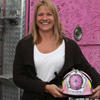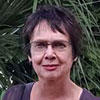When you’re diagnosed with cancer, your first reaction can be shock or fear. Your second is often an overwhelming desire for more information. But where do you go for that information, and how reliable is it? To some of our bloggers, that search involved a trip down the information superhighway. More than one blogger, though, advises that you limit your travel down this road.
-
Sue Northey
Diagnosis: Hodgkin's Lymphoma
Over the years, I have learned that everyone deals with their cancer diagnosis differently. Some want to learn everything possible about their type of cancer, the projected outlook and the treatment they will be receiving; others choose to only absorb what their medical staff tells them. We all cope in different ways, and that is totally fine. What is perfect for one person may be debilitating for another.
That being said, my approach was to immerse myself in everything I could find on the topic of Hodgkin’s lymphoma, ABVD chemotherapy and radiation. Since this was over a decade ago, the Internet was not quite as reliable as it is today. I made the mistake of talking to some people in a chat room about what to expect when I had my bone marrow biopsy. It was the biggest mistake I made during my cancer journey.
After that misstep, I learned to only approach reputable sources. I became involved with the Leukemia & Lymphoma Society of SE Wisconsin and found them to be extremely supportive and helpful. I also continued my research but only referred to academic medical centers and reputable nonprofit cancer organizations.
-
Beth Dowhen
Diagnosis: Squamous Cell Carcinoma
A lymph node biopsy determined the type of cancer I had (squamous cell carcinoma), but we wouldn't know where it was until we saw an ENT specialist in about a week. Like many others, I turned to the next best source, “Dr. Google.” Unfortunately, Dr. Google can be quite out of date and unreliable. By the end of my first session, I was scared to death!
Since then, I found that research papers, journal articles, and sites managed by hospitals or large foundations provide more accurate information. Because cancer researchers are discovering new treatments at an impressive pace, it is also important to look for the most current news.
Some of the sites that are good resources for me are The Oral Cancer Foundation, Livestrong Foundation, and those of medical centers such as Froedtert, the Mayo Clinic, or M.D. Anderson Cancer Center. The American Cancer Society (csn.cancer.org) discussion boards allow people who have the same type of cancer to offer each other tips and support. Be sure to discuss any research findings that concern you with your doctor.
As you do your research, remember that you are not a statistic. You are a uniquely created individual and your oncologist will tailor a treatment program to meet your specific needs.
-
Rodney Schroeter
Diagnosis: Gastrointestinal Stromal Tumor
When told that I had a GIST, a gastrointestinal stromal tumor, my first thought was: That was not good. I know enough that “gastro” means “stomach,” and that “tumor” means... well, “tumor.” And, based on what I’d heard in my lifetime, I believed that I knew that stomach cancer was not good. I didn’t let things get too mentally out of control for the next hour, because of the above clause, “I believed.” I didn’t know for sure. What I needed was factual data. And when I obtained that data, things were a lot better.
The first place my wife and I found information was the Internet. Some science fiction writers, decades ago, asked, “What would life be like if each person had the sum total of human knowledge easily available?” We’re living in a time when we can answer that. We learned right away that the prospects for GIST tumors were fairly optimistic, that they’re usually removed surgically, and that they rarely grow back.
The second place we received information from was Dr. Fabian Johnston, who opened his schedule for us the day after the diagnosis (what a guy!). He would be one of the two surgeons who would remove my GIST. I had the usual questions. My wife’s questions were more advanced. But then, you’d expect that from a wife with a PhD, who’d worked as a surgical nurse for many years. Dr. Johnston answered all of our questions.
-
Kristin Ciganek
Diagnosis: Colorectal Cancer
My sister Sandy came with me to my initial appointments at the Cancer Center. She is firefighter/paramedic with the Milwaukee Fire Department, but she is also a nurse. There was so much information to take in, I was happy she was there, because I probably only heard half of it. Sandy also asked numerous questions I would not have thought of. I wish I had brought a pen and paper to write down everything, there was just so much I had never heard of.
After I had a chance to digest the information, I started having questions myself. I decided to look on the Internet for answers instead of bothering the doctors or nurses. I was warned by others that the Internet was not the place to go, but I thought, "How bad could it be?" Boy oh boy, the information I found just made my anxiety go through the roof. I read all about the side effects of chemo, that only 8% of people with my diagnosis make it five years. I found blogs/sites with other families’ stories about their loved ones’ terrible battles, and I did not find any positive information. I was left feeling very hopeless.
The good thing that came out of this, I now know the doctors and nurses really meant it when they told me to call with any questions that I had. They give you their phone number and email, and they return calls or emails very quickly. I also hope that other people looking for answers on the Internet like I was find my story as inspirational and that it gives them hope that I could not find.
I would encourage people that are meeting with their doctors to bring someone with and at least one of you have a notebook and pen. I was still in shock about even being there; if Sandy had not come with me I definitely would have been lost. Use that notebook to write down questions you think of after the appointment -- there will be many. Most importantly, the Internet is a good resource, but listen to people who tell you not to look there for answers, because it just makes things worse. Lastly, don't feel like you are bothering your doctors by calling/emailing them. They would rather have you ask 100 questions instead of stressing about the unknown.
-
Paul Lawonn
Diagnosis: Mantle-Cell Lymphoma
To be honest, when I was first diagnosed with cancer it took some time to “catch my breath” before I could even think about looking for specifics. When I did start looking, I did what everybody does when they don’t have answers and need information: I went to the Internet. Wow – that turned out to be a big mistake. The day I got my final diagnosis, I spent hours searching the Internet for information on my type of lymphoma. I ended up overdosing on information I didn’t understand and information that confirmed every bad thing I had ever heard about cancer. All that surfing left me emotionally depleted and scared of what was ahead. I remember crawling into bed that night emotionally drained and feeling very helpless and hopeless.
Even today, many years later, when you Google “lymphoma,” you will come up with almost 20 million sites to explore! You have to wonder how many of those sites will provide concrete information. More importantly, how much of that information will you truly understand? There is a high probability that you too will end up being overwhelmed with negative and frightening information. The first step in my "Seven Steps to Persistent Perseverance" is to stay positive. That means blocking the flow of negative information that comes from too much Internet surfing. When it comes to serious topics such as cancer, get your information from reliable sources you can trust. That’s what I did.
The nurses and doctors at the cancer clinic became my trusted sources of accurate and reliable information on my disease and how it is treated. These professionals are on the frontline of cancer care every day; they have dependable first-hand information. Random information on the Internet won’t help your specific questions or concerns. It is in your best interest to develop trust in your cancer clinic and the information they provide. Even if your type of cancer throws your team a curve ball (like mine used to do…), they have a network of cancer specialists who are able to find solutions to your circumstance. Here’s a final thought: To this day, as a survivor, I won’t even casually browse the Internet for lymphoma information; my Froedtert team remains my source of information.
-
Tim Moran
Diagnosis: Chronic Lymphocytic Leukemia
Before I was diagnosed, I was told by my family doctor that my white cell count was high and that he was making an appointment for me to see an oncologist. I remember my wife and I sat down at the computer and went to a website from one of the hospitals in the area. We looked up what having a high white cell count could be. The computer kicked back at us, leukemia. This absolutely scared us completely. We later went to the oncologist and he confirmed our fears, that I did, in fact, have leukemia.
-
Susan Stansbury
Diagnosis: Pancreatic Cancer
When I was diagnosed with pancreatic cancer, I already knew of its deadly reputation. Then I looked for specific detail from my Froedtert medical team. I also read everything posted on the Medical College of Wisconsin/Froedtert website, including papers and studies in which my doctors Johnston and Evans participated. I gained further understanding from reputable websites on this pernicious pancreatic cancer. This includes sites such as Johns Hopkins and Mayo Clinics, plus pancreatic cancer sites.
-
Jack Henning
Diagnosis: Stomach Cancer
My cancer was first diagnosed in the stomach, with a spot on the lung. They did microscopic surgery on the right lung and removed the cancerous lobe. Stomach surgery was scheduled a month later to remove a neuroendocrine tumor, but it turned from a four-hour surgery to an eight-hour Whipple procedure that involved cancer in the liver and pancreas also.
The point I would like to make is doctors can do all the tests they want, BUT they still don't know fully of other problems till they start the surgery. And I thank Dr. Gamblin and his team for doing what was necessary for the outcome I have today. A person can read all about their medical problems and what this person has, etc, and share that info with your surgeon, but no one knows till the surgeon opens you up what your outcome will be.
My outcome sounds bad (eight-hour surgery involving stomach, liver and pancreas), I but I am very fortunate at this time to be cancer free, and I also did not need any other treatments -- radiation etc.
-
Jennifer Kelliher
Diagnosis: Sarcoma - Desmoid Tumor
My cancer being a type of sarcoma, it was really hard to do much research on my own. There are hundreds of different variations of sarcomas when you consider all of the really random ones (like mine turned out to be); so honestly, my doctor was the best source of information for me early on. Any research I did on the Internet was way too broad to be really helpful for me. Even my biopsy only narrowed it to spindle cell sarcoma, which was still a little broad. I felt like the information I read online didn’t always apply closely enough to my situation to be helpful. I was careful not to jump to conclusions based on what I read online.
After removal, the pathology revealed the full diagnosis of my tumor – a desmoid tumor. I did do some Internet searches during my recovery to learn more about it. Some of the information I found substantiated what my doctor told me… they are very, very rare. About two people in a million are diagnosed with them, and there are likely more cases, but since it is often misdiagnosed, it is hard to tell. I also read in more than one place about a very high recurrence rate on these tumors. One website reported 70%. That really struck me. But sometimes you have to draw your own conclusions. The more I read about the difficulty in diagnosing this, it became pretty logical to me why the recurrence rate was so high. You don’t exactly know how they calculate that number. If doctors aren’t always catching this type of tumor for what it is, they aren’t taking wide enough margins to ensure the tumor doesn’t recur. So of course the recurrence would be high. My doctor DID know what he was dealing with. He took really WIDE margins. He set me up for success! So I gave myself a mantra… “I am the 30%.” I decided I was already two in a million with this tumor, so why couldn’t I be part of the 30% in which it didn’t recur?? (I certainly prayed a lot too, but the mantra really helped manage the human doubt that still likes to creep in from day to day!!)
As they always say, be careful of what you read on the Internet. There are so very many different types of cancer, it’s somewhat doubtful that you’ll find information really tailored to your case. I consider myself blessed to live so close to a facility like Froedtert & the Medical College of Wisconsin. (And no, they did not make me write that!!) After the research I did on my tumor, I think it’s highly likely that had I been at a different facility, I would have been part of the 70%... but instead, “I AM THE 30%!!”
-
Veron Gray
Diagnosis: Dedifferentiated Liposarcoma
Because of the location of the mass, they were uncertain what type of cancer this was, because it was rare. We could not do a biopsy because that would have been too risky due to location. So I could not do much research on my own.
Most of my information came from my oncologist at Froedtert Hospital, which was my second opinion. He was very knowledgeable, and I felt a sense of trust working with him and that most of our questions would be answered once the mass was removed and biopsy completed.













As an oncology Clinical Nurse Specialist I triage calls daily from patients searching for information. To share a few of my favorite resources:www.patientresource.com Excellent, evidence based information written in patient friendly language. Any of the cancer types can be downloaded, or ordered in a book publication. All material are of no charge. Secondly, I would advise any patient to seek out the NCCN patient guidelines as a resource https://www.nccn.org/patients/guidelines/cancers.aspx. Finally https://wicancer.org/resources this is also a great resource for the state of Wisconsin.